The sound of happiness
- Published
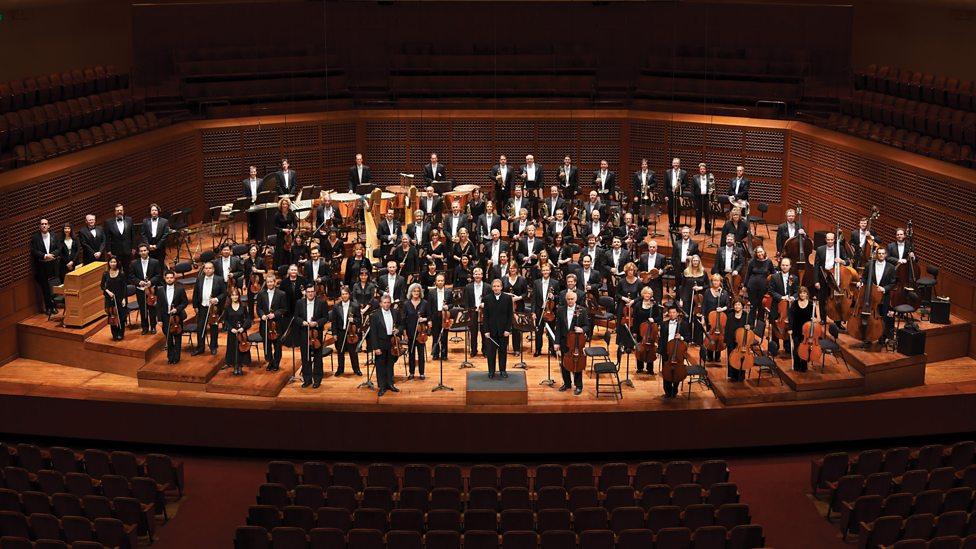
San Francisco Symphony at the Usher Hall proved to be "oustanding"
Did you catch much at the Festival? For me, the customary eclectic mix.
For example, over the weekend....
an outstanding concert by the San Francisco Symphony at the Usher Hall
a couple of stimulating Book Festival gigs; at the Pleasance
Tubular Bells for Two (which transported me instantly to university days)
and a powerful production of Lanark at the Lyceum.
Pausing for breath, my family and I also took the chance to wander round the Museum of Edinburgh in the Canongate. Mea culpa, but I had not appreciated it contained so much.
Rather than a single building, it is a network of rooms, all dating back to much earlier days when the Canongate was a distinct burgh. And the contents: a glorious mix.
Volcanic eruptions
Wonderful silverware from the time when these premises were home to the Hammermen; a copy of the National Covenant; street designs and much, much more.
The display would perhaps benefit from a little reshaping or modernising. But it is a delight and the staff we encountered were helpful, well versed in their history and enormously enthusiastic.
Other than the buildings themselves, the biggest impact upon me came from an audio visual display. It talked of Edinburgh from pre-history to the present day, from volcanic eruptions to peaceful political reform.
It placed Scotland's new devolved parliament in a stream which featured, inter alia, the Reformation, the Enlightenment and the Unions, Crown and Parliament.
All of which prompted me to think. Firstly, that our justified focus upon the mundane in politics can sometimes blind us to substantial underlying change.
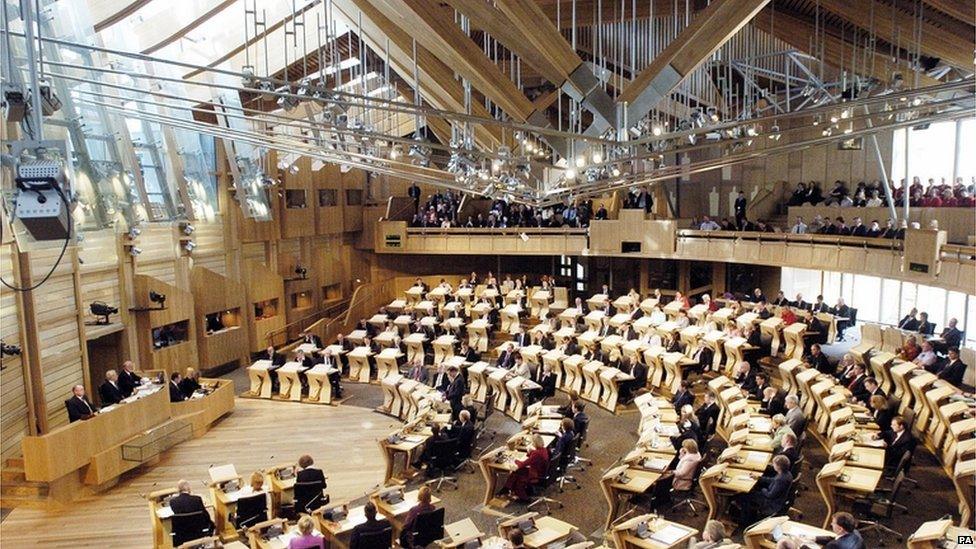
The new political term is about to begin at the Scottish Parliament
It is right that we demand to know what our MSPs are doing to improve Scotland's everyday lot - absolutely right.
But let us not forget the sheer scope of change involved in the restoration of an elected parliament.
Nothing less than an alteration or perhaps addendum to the Act of Union itself which had specified that the United Kingdom would be represented by "one and the same Parliament to be stiled the Parliament of Great Britain."
Examining the museum, I wondered which event in history would require to be added to the timeline in the future, given the high bar which historical perspective inevitably applies.
As that new devolved parliament resumes work this week, are we again witnessing an historic change in Scotland - with the pre-eminence of the SNP - or is it a transient phenomenon?
'Contemplate happiness'
More prosaically, will that pre-eminence persist through to the Scottish Parliamentary elections in May? Politicians, understandably, describe each forthcoming electoral contest as "historic", as the biggest choice facing the people since - well, the last one.
But perhaps the start of a new term, the final run-in to those elections, might prompt a wider assessment. Perhaps too I might step back from history and instead contemplate happiness.
Who, among our leaders, is entitled to offer the cheeriest perspective upon political life at the moment? Of course, they will each offer a sunny countenance. But which is most soundly based?
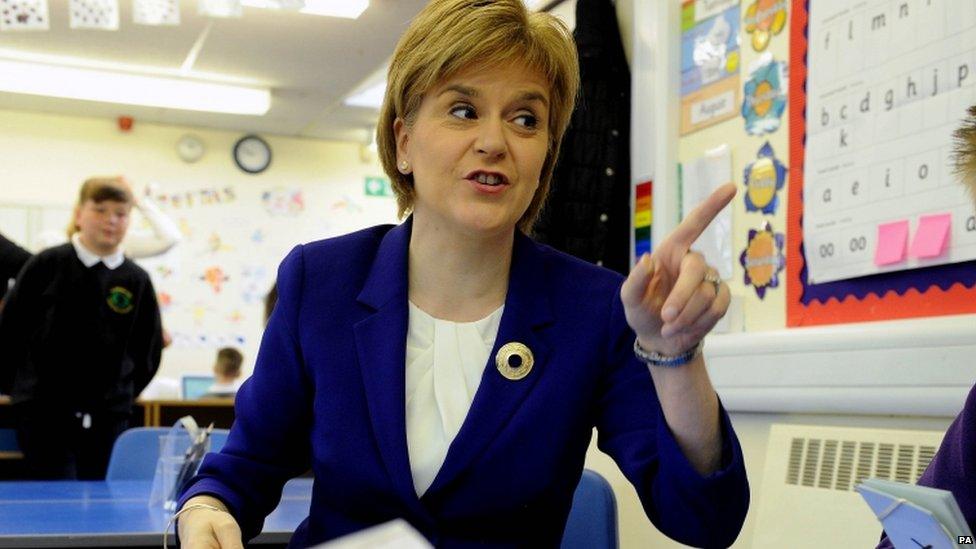
Nicola Sturgeon is First Minister of Scotland
Consider Nicola Sturgeon. She tends to keep a calm sough in adversity and triumph. But she has undoubtedly had more of the latter of late, most notably at the UK General Election. Plus her personal ratings are decidedly high, with little sign yet of a determined challenge to the SNP's lead.
She has a tricky balancing act ahead. Does she signal a second referendum on independence and energise her party, especially those new members? Or does she proceed with caution?
Remember always that Ms Sturgeon has minimal interest in gesture politics. She does not want to hold a referendum. She wants to win a referendum.
She has said she would not presently support a second referendum without a "material change" to current politics: such as might be represented by British withdrawal from the EU without Scottish consent.
But such a scenario, should it emerge, would only do so down the line, after the Scottish elections and well after she is due to pen her party's manifesto.
It might remain open to her, therefore, to indicate that she is not currently minded to hold a second plebiscite - but that she retains the option in the event of "material change". We shall see.
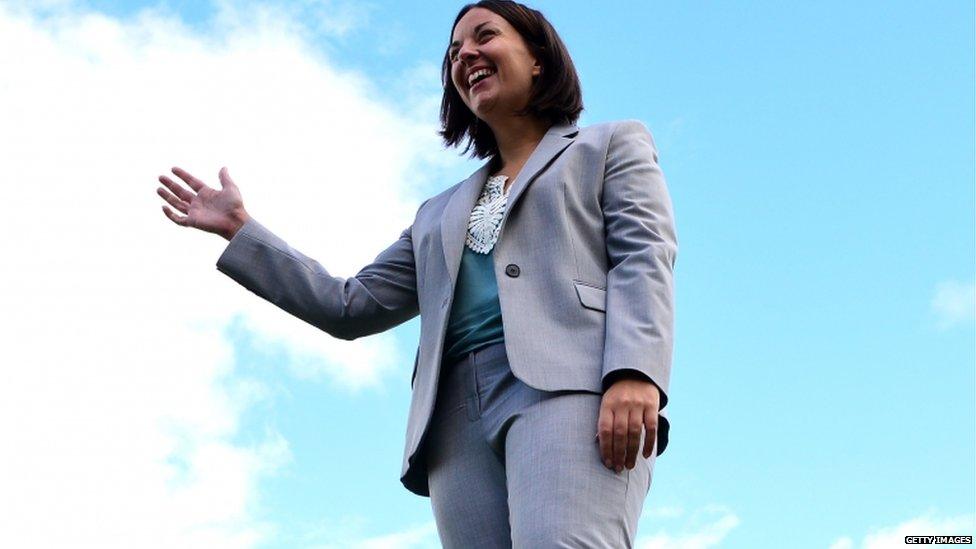
Kezia Dugdale won the Scottish Labour Party leadership election last month
To Kezia Dugdale, then. She hopes to bring a fresh outlook to the Scottish Labour Party - and extends that to candidates, making pretty clear on GMS that she does not want erstwhile MPs to regard Holyrood as a speedy route back into parliamentary life.
She offers the perspective of youth, for example regarding the invasion of Iraq as a distant event and preferring to focus upon the future. Others might not share that approach and, by definition, youth also means relative inexperience.
It is to Ms Dugdale's credit that she appears anxious to shed any residual arrogance which might have clung, limpet-like, to the once powerful Scottish Labour machine. She knows Labour was thumped. She knows it was a long time coming. She knows it was no fluke. She plans to get even, not grumpy.
However, she does not operate in a vacuum, however much she emphasises the relative autonomy of the Scottish party over policy and operation. For one thing, that autonomy only extends to devolved matters. Reserved policy choices, such as over defence and the macro-economy, lie at Westminster.
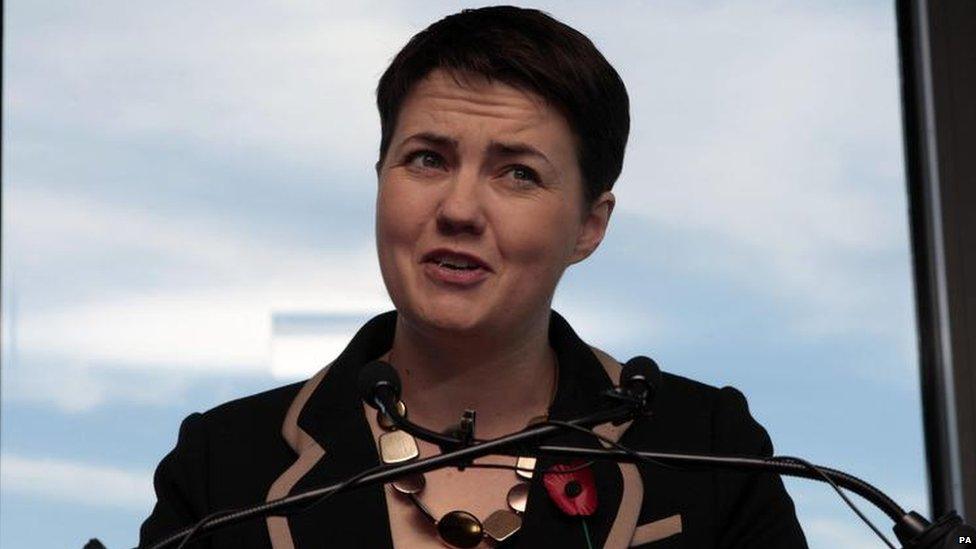
Ruth Davidson is leader of the Scottish Conservative Party
Secondly, voters do not see politics in terms of silos. They will garner a general impression of Labour from all they know: at ward, council, Holyrood and Westminster levels. So the election of a new UK leader - whether it is Jeremy Corbyn or one of his rivals - will inevitably affect Labour's standing in Scotland. Either up or down.
Setting that aside for now, Ms Dugdale's endeavour in the next few weeks will be to project Labour values (and, eventually, policies) while attempting to challenge the Scottish government on its record in office. She knows that voters, at the moment, seem inclined to favour the SNP approach and to pay little heed to criticism. She can only hope to change that. Before May.
To Ruth Davidson, then, perhaps the most resolutely upbeat of the lot. All around her, the long Tory slump in Scotland persists. Is she downcast? Is she doom-laden? Is she Ms Mona Lott? Quite the reverse. It really is being so cheerful that keeps her going.
By contrast with Labour, the Tories have had decades in which to get used to coping with disaster. They are good at it. They almost relish each reverse. Almost.
But they have one rather big compensation. They are in UK power - and able to exercise that politically. Only today the Chancellor has announced substantial investment in Faslane. That announcement operates at several levels.
Firstly, it is a structural announcement affecting the fundamental upgrading of the base.
Secondly, it is a clear pointer to the eventual decision to replace the current Trident deterrent: a direct challenge, therefore, to those in Scotland and elsewhere who object to that approach. Politically, it is a calculation that there are votes to be gained from nuclear deterrence, as well as shed.
Thirdly, it is a statement of UK power, economic and political. The chancellor is at pains to stress the jobs retained and potentially created by his announcement. He is inviting voters to infer that such jobs are a consequence of the sustained Union.
Fourthly, it is a challenge to the SNP with their stance of nuclear disarmament. What would happen to Faslane? What would happen to the jobs? What would happen to Scotland/Britain's place in the world? What would happen to geopolitics?
The SNP answer is that Faslane would become a conventional military base, retaining jobs. Further, they dispute the chancellor's figures with regard to employment. More widely, they argue that Scotland would be a non-nuclear member of Nato contributing to defence and global disarmament.
Finally, today's announcement is a challenge to Labour. The UK leadership contest has inevitably revived debate within Labour over the party's stand on Trident. George Osborne is seeking to inflame that itch.
Ruth Davidson's aim will be to ensure that interventions by her UK government colleagues - not least over new powers for Holyrood - can be depicted as positive and helpful, rather than overweening and censorious.
Left and right
And Willie Rennie, for the Liberal Democrats. His smile is never broader than when he is up against it. He has made survival an art. Mr Rennie now says that his party will regain the centre ground, depicting his rivals as fleeing that territory to Left and Right in pursuit of ideological contests of their own. Again, we shall see.
And more. The Greens, with hopes of building upon present performance to return to their erstwhile strength at Holyrood. The new Left Alliance, RISE.
Glance ahead. What do you expect? History or happenstance?